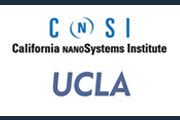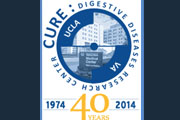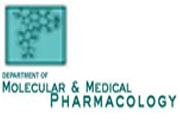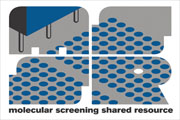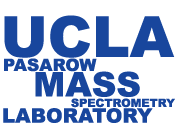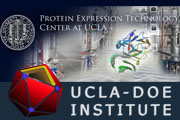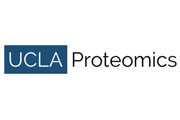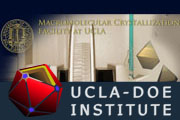Analytical Phytochemical Core
Jieping Yang
jiepingyang@mednet.ucla.edu (310) 825-3126
1000 Veteran Avenue, Rehabilitation Building
Center for Human Nutrition
Provides nutrition and food researchers with a range of analytical services including the quantitative analysis of biological active ingredients in fruits, vegetables, beverages, botanicals and dietary supplements; preparation and standardization of plant extract; measurement of in vivo and human blood and tissue absorption of phytochemicals (or therapeutic drugs); characterization of metabolites from blood, tissue, urinary and fecal samples; quantification of chemical carcinogens, contaminants, toxins in food and dietary supplements, and other chemicals such as short (C2-C7) and long chain fatty acids, cholesterol, bile acids in biological samples and amino acids using HPLC, GC, LC-MS methods.

UCLA-DOE and Biochemistry Instrumentation Core Facility
Martin Phillips mlphill@ucla.edu (310) 206-2205
Matthew A. Graf bita@chem.ucla.edu
Young Hall 5060 & 5048
biochem.cores.ucla.edu
The UCLA-DOE Biochemistry Instrumentation Core Facilities provide the UCLA biochemistry community with easy access to sophisticated instrumentation for a wide variety of biomolecular characterizations, including molecular weight determination, kinetic and thermodynamic analysis of ligand binding, structural characterization, gel documentation and analysis, radioisotope detection and quantification, and spectroscopy.
Bioscience NMR Core
Robert Peterson peterson@mbi.ucla.edu (310) 825-1816
Molecular Sciences Building Room 1435
The Core provides access to high-field NMR instrumentation for users who need long blocks of instrument time to investigate biological problems such as structure determination, ligand binding, dynamics, etc. Also provided are training and assistance in experimental setup, and consultation with spectral processing and analysis.
Bioscience Synthetic Chemistry Core Facility Michael
Jung jung@chem.ucla.edu (310) 825-7954
http://clms.cnsi.ucla.edu/cnsi/clms/equipment-list?search_lab=12853
A dedicated laboratory for the synthesis of small organic molecules to aid bioscience research.
CURE Integrated Molecular Technologies Core
Emmanuelle Faure Efaure@mednet.ucla.edu (310) 825-7122
The overarching objective of the Integrated Molecular Technologies (IMT) Core is to promote and facilitate basic and translational GI research by providing CURE: DDRC investigators with access to state-of-the-art molecular technologies, including: 1) expertise, equipment and services for systems biology and high-throughput screening analyses; 2) expertise and viral vector cloning and production services to genetically engineer mammalian cell lines and primary cells for expression or inhibition of proteins and miRNAs both in vitro and in vivo.
Immune Assessment Core
Maura Rossetti mrossetti@mednet.ucla.edu (310) 983-3993
1000 Veteran Ave., Rehab Center A-538
http://pathology.ucla.edu/body.cfm?id=651
Multiplex Luminex assays for the detection of protein and RNA in body fluids, supernatants and lysates.
Inductively Coupled Plasma -Mass Spectrometry (ICP-MS)
Shane Que Hee squehee@ucla.edu (310) 206-7388
CHS 56-071A (office); CHS 61-297 (facility)
http://ehs.ph.ucla.edu/news/icp-ms-facility-ehs
Simultaneous quantitation of elements at the ppb -ppm level.
Magnetic Resonance Facility
Robert Taylor taylor@chem.ucla.edu (310) 825-5940
Molecular Sciences Building Rooms 1416 and 1421
http://www.mic.ucla.edu/magnet
Mass Spectrometry and Proteomics Laboratory
Gregory Khitrov khitrov@chem.ucla.edu (310)-825-6070 office
(310)-825-1241 – lab
Molecular Sciences Building Room 1430
http://www.mic.ucla.edu/mass-s
Provides a wide range of sample characterization techniques for UCLA researchers, other academic institutions, and commercial enterprises.
Materials Characterization Laboratory
Ignacio Martni martini@chem.ucla.edu (310) 267-5467
Young Hall Room 1045
http://www.mic.ucla.edu/materi
Enables thermal, optical, microscopic, electrical and magnetic characterization of materials and elemental analysis of surfaces.
Molecular Screening Shared Resource
Robert Damoiseaux rdamoiseaux@mednet.ucla.edu (310) 794-1974
Ken Bradley kbradley@microbio.ucla.edu (310) 206-7465
CNSI 2145
The MSSR is a core facility open to all research labs on campus. The services provided include the use of high throughput screening (HTS) technology, a total of roughly 200,000 compounds in various libraries, siRNA sets of the druggable genome for mouse and human and a database of results from screens. Please use the links above to find out more about the MSSR. The MSSR is currently funded by the JCCC, the Department of Molecular and Medical Pharmacology, the Department of Microbiology, Immunology and Molecular Genetics, and the Dean’s office, David Geffen School of Medicine and the California NanoSystems Institute.
Pasarow Mass Spectrometry Laboratory
Kym Faull faull@chem.ucla.edu (310) 206-7881
NPI-Semel Institute Room # 68-146 and 68-162
http://massspec.chem.ucla.edu/
Provides consultation, training, and access to and technical assistance for metabolomics, proteomics (top-down and bottom-up) and targeted small molecule quantitation using mass spectrometery and contemporary chromatography.

Peptide Synthesis Core Technology Center
CHS 37-046
http://people.healthsciences.ucla.edu/institution/groups-detail?group_id=524217
The Peptide Synthesis Core Facility (PSCF) contains a dedicated fume hood for peptide deprotection and cleavage. The facility assists investigators performing multifaceted investigations of peptides by providing peptides that are difficult to synthesize, fold, and purify (e.g., beta-sheet peptides with multiple disulfide connectives, cyclic peptides, or amyloid peptides). In addition, the PSCF can synthesize isotope-edited versions of proteins and peptides suitable for detailed determinations of 3-D molecular structure by NMR spectroscopy or X-ray diffraction.
Protein Expression Technology Center
Mark Arbing marbing@mbi.ucla.edu (310) 206-2871
Boyer Hall Room 103
http://www.doe-mbi.ucla.edu/expression
The Protein Expression Technology Center (PETC) was founded in 1994 to facilitate the expression and purification of proteins for structure/function studies. The PETC provides support in all aspects of protein expression from cloning through expression optimization and protein purification. The PETC is a UCLA-DOE Institute for Genomics and Proteomics facility but is open to all researchers.
Proteome Research Center
James Wohlschlegel (310) 794-7955 jwohl@mednet.ucla.edu
Ajay Vashisht (310) 267-0585 avashisht@mednet.ucla.edu
357-11 Biomedical Sciences Research Building
http://www.uclaproteomics.net/
The UCLA Proteome Research Center is a full-service technology center that offers a comprehensive suite of proteomic services to the UCLA community and other partnering institutions. By bringing together state-of-the-art instrumentation and high-level technical staff, the goal of the facility is to transform traditional experimental paradigms by providing investigators access to powerful analytical workflows for systems-level characterization of complex biological systems, biomarker discovery and validation, and protein complex characterization. Available services include: (1) complex protein mixture analysis using single and multidimensional fractionation strategies, (2) peptide quantitation using SILAC, iTRAQ / TMT, and label-free methodologies, (3) targeted and global PTM enrichment and characterization approaches, (4) identification of protein interaction networks using affinity-based isolation and proximity tagging techniques, and (5) targeted proteomic assay development using parallel reaction monitoring (PRM) for relative and absolute quantitation.
Surface Plasmon Resonance Core
Tomas Ganz tganz@mednet.ucla.edu (310) 825-7499
CHS 37-056
http://people.healthsciences.ucla.edu/institution/groups-detail?group_id=524193
The Surface Plasmon Resonance Core consists of a Biacore 3000 instrument that uses a powerful technique called surface plasmon resonance (SPR) to monitor binding interactions between two molecules. The Biacore 3000 instrument provides precise, sensitive, real-time results, using microgram amounts of non-radiolabeled samples. In its ligand-recovery mode, the instrument can be used as a nano-affinity column to recover binding partners from crude mixtures of potential ligands. Its robotic recovery feature precisely transfers recovered samples to plates suitable for MS analyses. Services include: (1) selection and preparation of the biosensor chips using investigator-supplied proteins, (2) running binding assays at various analyte concentrations, (3) calculating the binding constants, (4) providing the raw and analyzed data to the investigator, and (5) discussion of the results.
X-ray Crystallography Condition Screening
Michael J. Collazo mcollazo@mbi.ucla.edu (310) 882-2585 Boyer Hall Room 106
http://www.doe-mbi.ucla.edu/crystallization
Consultation and technical assistance available to researchers prior to, and following, experiments. Evaluation of sample via Dynamic Light Scattering. Automatic setup of 4000 crystallization conditions per hour using 500uL of sample. (Hanging or Sitting Drops) Capable of distinguishing between organic and inorganic crystals using a sophisticated UV/vis microscope. Optimization of crystallization conditions. Storage of plates in temperature controlled incubators at 4°, 15°, and 20° C. Optimization of crystallization conditions using a library of 1,500 commercial compounds. Production of stereolithography files from Pymol, 3D design of labware, 3D printing.
X-ray Crystallography Technology Center (Macromolecular)
Duilio Cascio cascio@mbi.ucla.edu (310) 885-1551
Boyer Hall Room 124
http://www.doe-mbi.ucla.edu/facilities/x-ray
Provides experimental and computational facilities for X-ray based structure analysis and refinement, and for supporting structure determination by crystallography, and computational methods. Acquisition of X-ray diffraction data using in-house high brilliance generators. Acquisition of Multi-wavelength Anomalous Dispersion data using synchrotron radiation X-ray diffraction data processing and manipulation. Assistance with the macromolecular model building and structure refinement processes. Guidance in the interpretation of the resulting three-dimensional macromolecular structures. Web-based services that include tutorials and software tools to assist users. Workshops and informal classes introducing the fundamentals of single crystal X-ray diffraction work to potential users. These workshops also provide an overview for how the core functions and how users may interface with Core personnel. Micro crystallography: rapid screening of micro-crystals with the UV microscope. Manipulation and dissection of micro-crystals with a micro-manipulator.
X-Ray Diffraction Laboratory (Small Molecule)
Saeed Khan khan@chem.ucla.edu (310) 825-5940
Molecular Science Building, Room 1416
http://www.mic.ucla.edu/X-rays-Diffraction
Provides 3-dimensional structure of small molecules in solid crystals via X-ray crystallography. Equipped for characterization of polycrystalline solid materials using powder and thin film diffraction techniques. The laboratory is a full service facility where staff deals with all aspects of service from crystal selection to publication of results. In-house training is a requirement if you wish to use the equipment yourself. Part of the UCLA Molecular Instrumentation Center, which is a campus wide facility open to the UCLA community. The facility also collaborates with personnel from other universities and industry both locally and internationally.



